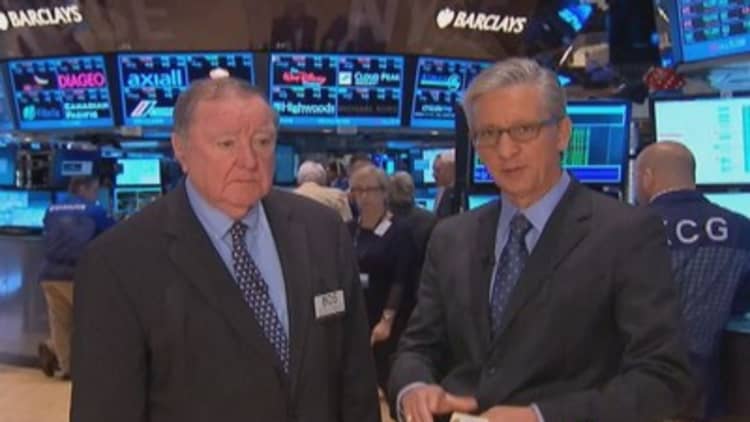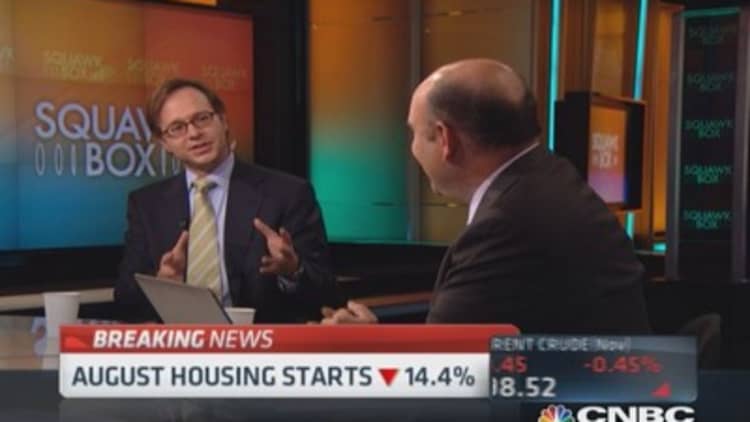
U.S. stocks rose on Thursday, with the S&P 500 and Dow industrials toppling records, as investors considered on jobs and the housing market and continued to relish the Federal Reserve's renewed vow to keep benchmark rates low.
"We've got low inflation, improving earnings and a central bank that appears to be a constructive force; what's not to like in this picture," said Jim Russell, senior equity strategist for US Bank Wealth Management.
"It all adds up to an environmental overlay that is extremely risk-asset friendly, Russell added.
Sears Holdings lost ground as Credit Suisse analyst Gary Balter called on the department store to liquidate; Peabody Energy dropped after Goldman Sachs downgraded the coal miner to sell from neutral; Rite Aid declined after the drugstore chain reduced its full-year profit outlook; Pier 1 Imports fell after the retailer cut its 2014 earnings forecast; ConAgra gained after the food producer reported better-than-expected first-quarter earnings, and Steel Dynamics rose after projecting results that topped expectations. Alibaba Group Holding plans to select a price for its initial public offering overnight.
Economic reports Thursday had the number of Americans filing for jobless benefits dropping to a two-month low and separately, housing starts declined in August. The Philadelphia Federal Reserve's index of factory activity in the mid-Atlantic region decelerated in September, but its employment component rose to its highest level since the middle of 2011.
The Fed on Wednesday reiterated its "considerable time" wording in reference to how long it would hold off on hiking interest rates. The central bank also signaled that it might increase borrowing costs more rapidly than previously thought, helping lift the dollar, with the U.S. currency rising to a six-year high against the Japanese yen.
Major U.S. Indexes
Rising 118 points to an intraday record, the Dow Jones Industrial Average added 109.14 points, or 0.6 percent, to close at 17,265.99, with DuPont leading gains that included all but two of 30 components, with oil-producers Chevron and Exxon Mobil dropping along with the price of oil.
Also rising to an all-time high above 2,012, the gained 9.79 points, or 0.5 percent, to 2,011.36, with financials and materials the best performing and utilities and energy the laggards among its 10 major sectors.
"We're comfortable with S&P 500 reaching 2,060 in 2014," said Russell, who reaches the level by calculating $117.50 per share times 17.5 on the multiple.
That said, analysts at US Bank Wealth Management are mindful of "earnings projections slightly below consensus, and a little concerned weak economic growth in Europe might have a headwind for the third and fourth quarters," said Russell.
"If Scotland were to succeed that would be a market-disruption issue where nobody understands what the next six months would look like in Europe, and at a time when Europe doesn't need a disruptive factor," he added of the referendum that had voters in country on Thursday casting ballots to determine whether Scotland will remain part of the U.K.
Turning higher for the week, the Nasdaq gained 31.24 points, or 0.7 percent, to 4,593.43.
For every two shares falling, roughly three gained on the New York Stock Exchange, where 676 million shares traded. Composite volume surpassed 3.2 billion.
The dollar turned lower against the currencies of major U.S. trading partners and the yield on the 10-year Treasury note used to figure mortgage rates and other consumer loans rose less than a basis point to 2.624 percent.
On the New York Mercantile Exchange, oil futures for October delivery fell $1.35, or 1.4 percent, to $93.07 a barrel and the gold-futures contract for December fell $9.00, or 0.7 percent, to $1,226.90 an ounce.
"Commodities don't act well in terms of upper price movement when the dollar is strong, and China continues to transition away from an industrial economy to some extend, and is less of a commodity user," Russell said of the recent hit to dollar-denominated commodities.
A third factor is the success of shale gas and oil in the United States, reducing domestic demand for crude, he added.
On Wednesday, stocks rose, with the Dow ending at a record and the S&P 500 back above 2,000, after the Fed said it was nearing the end of its asset purchases and reiterated it would not hike rates for a 'considerable' time.
Read MoreDow climbs to record finish as Fed sticks to script

—By CNBC's Kate Gibson
Coming Up This Week:
Thursday
Scotland independence vote
Alibaba IPO pricing
Friday
10:00 a.m.: Leading indicators
More From CNBC.com:


